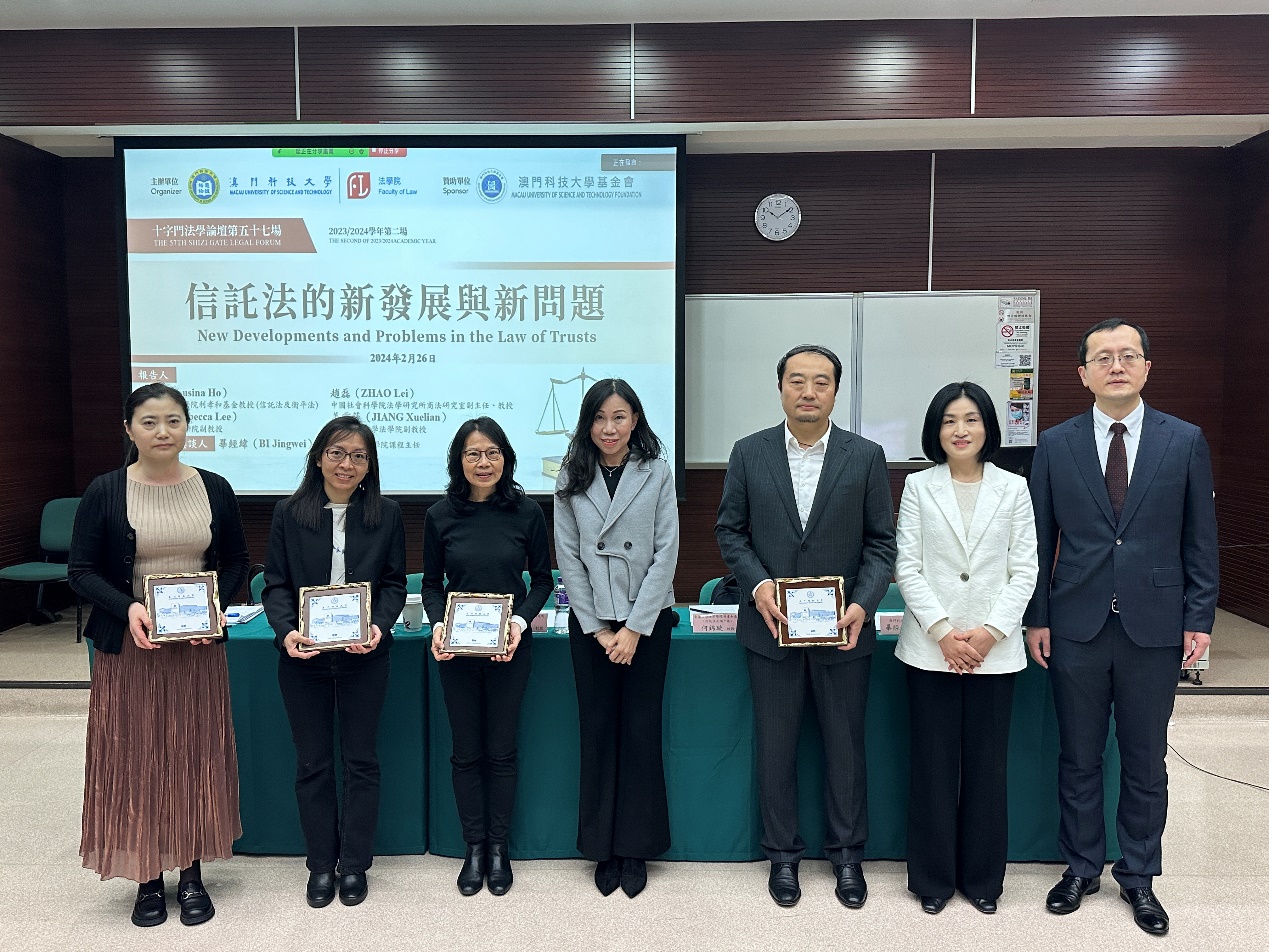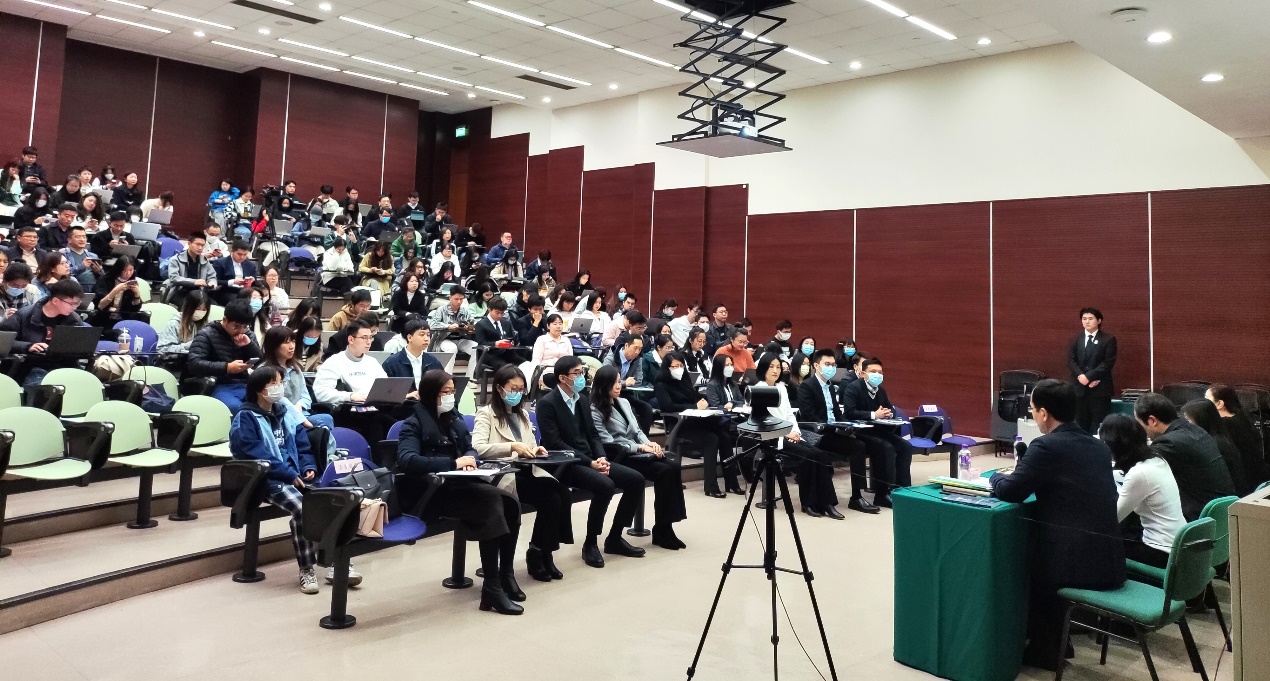At 10 a.m. on February 26, 2024, the 57th session of the Legal Forum of Macau University of Science and Technology (M.U.S.T.) Faculty of Law (the second session of 2023/2024 academic year) was successfully held in Lecture Hall N214 of the University. This event was organized by M.U.S.T. Faculty of Law and sponsored by the Macau University of Science and Technology Foundation. Regarding the theme of forum, is “New Developments and New Problems in Trust Law”.
It is an honor to invite Professor Lusina Ho, from Harold Hsiao-Wo Lee Professorship in Trust and Equity, Faculty of Law, the University of Hong Kong; Professor Zhao Lei, Deputy Director of the Research Office of Commercial Law, Institute of Law, Chinese Academy of Social Sciences; Associate Professor Rebecca Lee, Faculty of Law, the University of Hong Kong; and Associate Professor Jiang Xuelian, Beijing Institute of Technology School of Law, as guest speakers. In addition, Assistant Professor Bi Jingwei, Program Director of Faculty of Law, Macao University of Science and Technology, served as the moderator and speaker of the forum. Also present at the event were Dean Fang Quan from Faculty of Law, Macau University of Science and Technology; Ms. Lau Hangkun, a member of the Administrative Committee of the Monetary Authority of Macao (AMCM), as well as ten officers from Legal Affairs Department and Banking Supervision Department of the AMCM.

Figure I
Group photo of guests
(From left to right: Associate Professor Jiang Xuelian, Associate Professor Rebecca Lee, Professor Lusina Ho, Ms. Lau Hangkun, Professor Zhao Lei, Dean Fang Quan, Program Director Bi Jingwei)
At the beginning of the forum, Professor Fang Quan, Dean of M.U.S.T. Faculty of Law, sent souvenirs on behalf of the faculty to the guests and took a group photo. In the forum, Professor Lusina Ho gave a speech with the title “Reshaping Trusts: Inspiration of Scottish Trust and Inheritance Law”. Based on the discussion of the Scottish Trust and Inheritance Act, Professor Ho presented the responsibilities and obligations of trustees and believed that trustees should manage the affairs of others reasonably and prudently without disclosing the information of beneficiaries. Simultaneously, Professor Ho discussed the dynamic management and accountability mechanism of the trust mechanism, and pointed out that Hong Kong can operate the auxiliary mechanism of trust supervision through the court. This allows the court to review the implementation of the trust. Finally, Professor Ho introduced the relevant contents of trusts for non-charitable purposes to the students, covering both the implementation and policy levels. Professor Zhao Lei presented on “Sichuan Trust's Overdue Payment-the Main Issues of China's Trust Industry”, discussing the basic situation of Sichuan Trust's Overdue Payment, and introducing the structure of TOT trust products. Based these introduction, it is believed that China's trust as an imported goods lacks the concept of trust from the root, which meant that is still absent at both the judicial and supervisory levels. First of all, trust practitioners do not understand what trust is and do not really comprehend the trust system when conducting trust business. Therefore, the primary cause of the default and extension of a large number of trust products is the combined effect of weak risk control, poor management and decision-making errors. Secondly, the court's understanding of trust is inadequate, and the court has doubts about the nature of trust cases when adjudicating them, which can lead to significant differences in the application of law. On the whole, the overdue payment of trust has brought a significant warning to the banking finance and trust industry. It has also sparked considerable attention and reflection from regulatory authorities and the financial market. Under the title of “The Special Needs Trust in Hong Kong”, Associate Professor Rebecca Lee introduced that special needs trust is a form of trustee service. It originated in Europe and the United States and has gradually gained recognition and promotion in Asia and other regions in recent years. It belongs to a special trust system arrangement whose main purpose is to satisfy and serve the living needs of people with special needs. In addition, drawing on his extensive theoretical and practical expertise, Professor Lee elucidated the fundamental structure of special needs trusts in Hong Kong. She also provided a detailed overview of the requirements for establishing, operating, and terminating special needs trust accounts. This enabled the students to gain a more comprehensive and detailed understanding of special needs trusts. Finally, Professor Lee summarized the current challenges faced by special needs trusts in Hong Kong, arguing that the entrance fee for special needs trusts is too high and calling on the government to give more consideration to the threshold of trust purchase fees.
With the title of “The Investment Responsibility of the Trustee in Equity Trust”, using cases as the starting point such as the case of CITIC Trust and Qingdao Hairong Xingda, Associate Professor Jiang Xuelian introduced the issue of shareholders's liability identification during the equity continuation period. Through this case, Associate Professor Jiang argued that although the trust law has stipulated the registration of trust property and its legal effect, the supporting trust property registration system has not been established.
Despite the transfer of shares can realize the purpose of the trustee to control the shares, the isolation effect cannot be guaranteed because the registration of the transfer does not have the logo of the trust property in the appearance. At the same time, it is pointed out that how to coordinate trust law and company law on this issue is not only related to the balance and protection of the parties' rights in the case, but also related to the healthy development of the trust industry, which is a difficult realistic problem. Program Director and Assistant Professor Bi Jingwei made insightful comments on the presentations by the four guest speakers, and the forum concluded in a warm atmosphere.

Figure II
Venue of the Lecture
The Shizi Gate Legal Forum attracted nearly 200 teachers and students to participate. The topics of the participating scholars covered the development and practice of trust in various countries and regions. Their presentations offered rich content and diverse perspectives, expanding the theoretical and practical vision of the participants. Additionally, the discussions provided valuable insights for the advancement of financial modernization in Macao.




